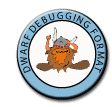
 |
DWARF Debugging Standard Wiki | |||
|---|---|---|---|---|
For detail description of the feature, please refer to:
http://www.research.att.com/~bs/C++0xFAQ.html#constexpr
http://www.open-std.org/jtc1/sc22/wg21/docs/papers/2007/n2235.pdf
The new keyword constexpr allows the user to guarantee that a data,
function or object constructor is a compile-time constant. Standard
allows floating-point constant expression as well. The constexpr is a
new declaration specifier (not a new type) and it does not affect
overloading rules. A variable or data member declared with constexpr
behaves as if it was declared with const. Constant expression function
must be defined before it is used, thus disallowing recursive function
calls. Function parameter cannot be declared constexpr. A
constant-expression function may be called with non-constant
expressions, in that case there is no requirement that the resulting
value be evaluated at compile-time. A function or a constructor declared
with constexpr is implicitly inline. A constant-expression
constructor may be invoked with non-constant expression arguments, the
resulting initialization may then be dynamic.
constexpr int Five = 5; // constant-expression data
constexpr int GetFive() {return 5;} // constant-expression function
struct integer {
constexpr integer (int a) : v(a) { }
constexpr int val() { return v; }
private:
int v;
};
constexpr integer numFive(5); // constant-expression constructor
// or user-defined literal
//create an array of 15 integers.
int some_value[Five+GetFive()+numFive.val()];
Purpose:
New DWARF attribute:
DW_AT_const_expr 0x69 flag A compile-time constant expression
3.3.8.1: Abstract Instances
In C++, a function or a constructor declared with constexpr is
implicitly inline. This abstract inline instance is represented by a
debugging information entry with the tag DW_TAG_subprogram. Such entry
has a DW_AT_inline attribute whose value is DW_INL_inlined.
3.3.8.2: Concrete Inlined Instances
Each inline subroutine entry may contain a DW_AT_const_expr attribute
whose value is a flag which indicates that the subroutine can be
evaluated as a compile-time constant. Such entries may have a
DW_AT_const_value attribute, whose value may be a string or any of the
constant data or data block forms, as appropriate for the representation
of the subroutine’s return value. The value of this attribute is the
actual return value of the subroutine, represented as it would be on the
target architecture.
In C++, if a function or a constructor declared with constexpr is
called with constant-expressions, then this concrete inlined instance
has a DW_AT_const_expr attribute, as well as a DW_AT_const_value
attribute, whose value represent the actual return value of the concrete
inline instance. Such entry also have DW_AT_call_file,
DW_AT_call_line and DW_AT_call_col, indicating where the subroutine
is called.
4.1: Data Object Entries
An entry describing a variable may have a DW_AT_const_expr attribute,
whose value is a flag which indicate that the variable can be evaluated
as a compile-time constant.
In C++, a variable declared with constexpr is implicitly const.
Such variable has a DW_AT_type attribute, whose value is a reference
to a debugging information entry describing a const qualified type.
constexpr double mass = 9.8;
<1>< xxx> DW_TAG_base_type
DW_AT_name double
DW_AT_encoding DW_ATE_float
<1>< yyy> DW_TAG_const_type
DW_AT_type <xxx>
<1>< yyy> DW_TAG_variable
DW_AT_name mass
DW_AT_type <yyy>
DW_AT_const_expr yes
DW_AT_const_value 9.8
constexpr int square (int x) { return x * x; }
float array[square(9)]; // square() called at line 3, column 12
extern const in medium;
const int high = square(medium); // high is NOT a constant expression
<1>< xxx> DW_TAG_base_type
DW_AT_name int
DW_AT_encoding DW_ATE_signed
! abstract instance
<1>< yyy> DW_TAG_subprogram
DW_AT_name square
DW_AT_type <xxx>
DW_AT_inline DW_INL_inlined
<2>< zzz> DW_TAG_formal_parameter
DW_AT_name x
DW_AT_type <xxx>
! concrete instance for square(9)
<1>< ...> DW_TAG_inlined_subroutine
DW_AT_abstract_origin <yyy>
DW_AT_const_expr yes
DW_AT_const_value 81
DW_AT_call_file 1
DW_AT_call_line 3
DW_AT_call_column 12
<2>< ...> DW_TAG_formal_parameter
DW_AT_abstract_origin <zzz>
DW_AT_const_value 9
! concrete instance for non constant-expression version of square()
<1>< ...> DW_TAG_inlined_subroutine
DW_AT_abstract_origin <yyy>
DW_AT_low_pc ...
DW_AT_high_pc ...
<2>< ...> DW_TAG_formal_parameter
DW_AT_abstract_origin <zzz>
DW_AT_location ...
|
dwarfstd.org is supported by Sourceware. Contributions are welcome.
All logos and trademarks in this site are property of their respective owner. The comments are property of their posters, all the rest © 2007-2022 by DWARF Standards Committee. |